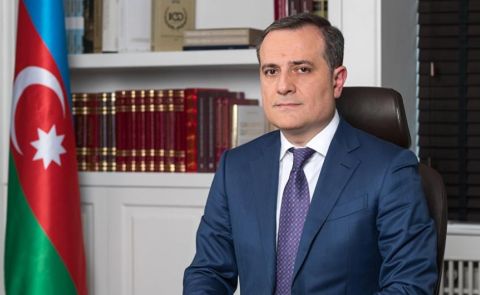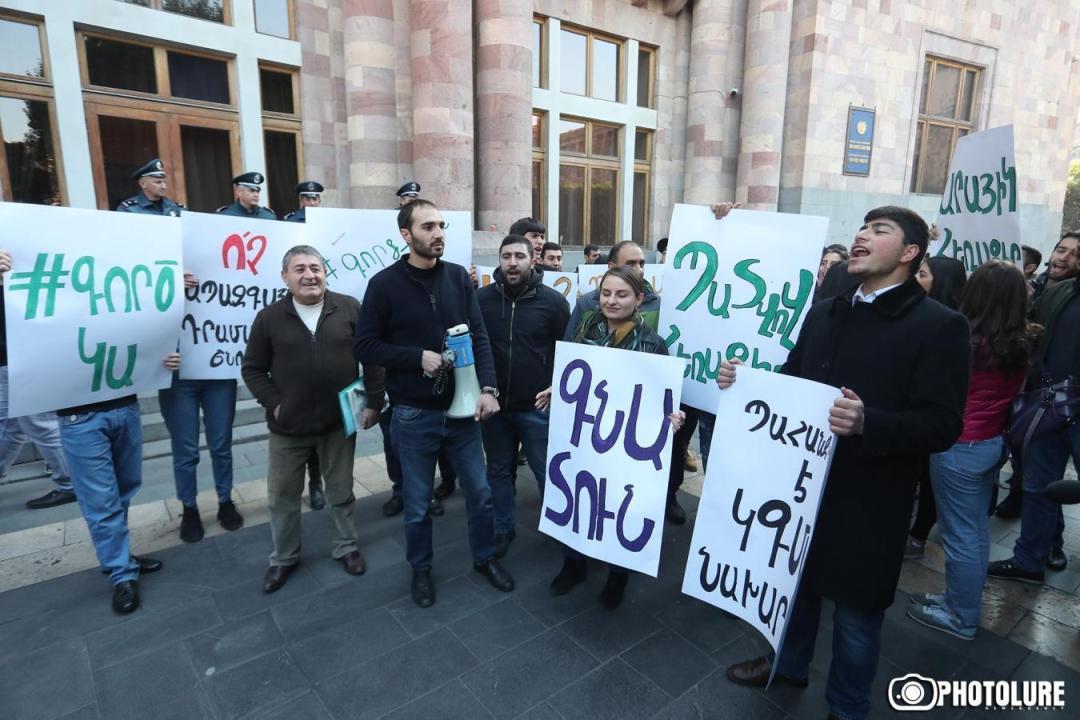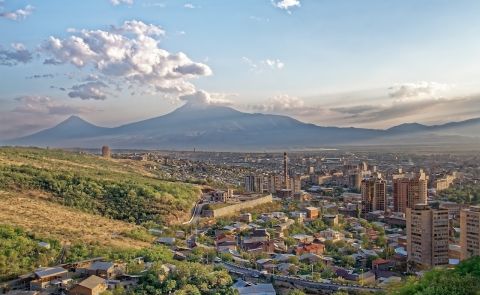
Student protests continue over the proposed education reform bill in Armenia

On 6 November, students from the Armenian Philology and History Faculties at Yerevan State University organised a student strike, boycotting classes and protesting against new reforms proposed by the Ministry of Education, Science, Culture, and Sports. The protests are still ongoing a week later.
The reason for the protests is based on the proposed bill “On Higher Education and Science”, which foresees that the teaching subjects “Armenian language”, “Armenian literature” and “History of Armenia” for students of non-humanitarian faculties would cease to be mandatory.
The students began marching towards the Armenian education ministry and collecting signatures for a petition to withdraw the proposed bill. They believe that the teaching of “optional” subjects at universities is not at the best level anyway. “But getting around the problem is not the best way to solve it. We can develop new mechanisms, organize public hearings, and form professional advice. And so it seems that someone had a dream, and in the morning decided to tell it. We are against this, because the subject ‘Armenian language’ is not the property of the minister. He must [speak] with students, professionals. But they were ignored,” said one of the organizers of the demonstration, student Gevorg Gyulumyan.
The students were also supported by university professors and officials in their efforts. Yerevan State University (YSU) History Faculty dean Edik Minasyan said that the Armenian language and the Armenian history are subjects necessary for the national security, upbringing of generations. “Our striking students mainly demand attention and development of a concept. The painful thing is that these urges of the students remain without response,” he said. The Dean of Pedagogical University’s History Faculty Edgar Hovhanissyan stated that he would join the protest. “It appears that if we have not succeeded to ensure rapid economic development and make Armenia a silicon valley, the [guilt is focused towards the study of]… Armenian language and Armenian history. It appears that after withdrawing these subjects we will have economic revolution in one year,” he said.
Two days before the protests, the youth wing of the Armenian Revolutionary Federation Party (Dashnaktsutyun), demanded the resignation of Armenia’s Education Minister Arayik Harutyunyan. The ARF-D Youth joined the protests on 7 November. They carried empty moving boxes and placed them at the ministry’s entrance to signal Harutunyan to use them to pack up his belongings and leave his position. Members of the ARF-D Youth organization said that the ministry has more critical priorities than spending tax-payer drams to fund projects that go against what they called “national identity.”
Kirsitine Vardanyan, a member of the ARF-D Youth Central Committee, said that the organisation believes that Harutyunyan has been gutting policies relating to education, science, culture and sports — without coming up with adequate replacements. “He’s crossing a red line by not properly developing policies in these fields, which are in a dire state,” she said. As for the ARF-D’s stance on the draft reform, Vardanyan explained that the main issue, for them, is not whether the subjects in question are mandatory or not, rather it is that the quality of the curriculum is not being addressed. As for protecting Armenian national values, Vardanyan said the ruling regime was ‘artificially’ pitting it against progressive values.
The education ministry issued a statement saying that each university was free to choose its mandatory curriculum, saying, “wide autonomy is given to universities under this bill to decide the content of educational and academic programs.” The ministry explained that in the event that the proposed bill is approved, the academic board of each university can decide whether these subjects should become mandatory in all departments. “Moreover, in order to be accepted to any university in Armenia, Armenian nationals – regardless of selected major – are obliged to pass a single examination of Armenian language,” explained the ministry. The ministry said the bill not only does not reduce the role of Armenian and Armenian studies, but on the contrary “stipulates the sowing of these important values and training of respective specialists.”
Harutyunyan also issued a public statement. He said that he was “ready to receive the group, listen to their demands, but as far as I understood it, not all of them are inclined to formulate the demand but are just implementing political action.” He also said he will be ready to resign after he considers that he has failed the implementation of his commitments.
He also addressed the demands of the ARF-D Youth. On a Facebook post he blamed the former ruling Republican Party and the Armenian Revolutionary Federation, who have both intermittently headed the ministry for the past 20 years, for uniting once again to try to disparage his name. “The reason for [these calls to resign] is that their “mafioso” infrastructures and their control are starting to wane in the system,” he wrote. Addressing criticism of his ministry for funding controversial projects, Harutyunyan said that the overall budget for art grants was over 900 million Dram ($1.9 million) and they prioritised national cultural projects.
Experts are also divided in their opinions over the proposed bill. Education expert Serob Khachatryan has already spoken out against the bill. “If many people don’t like the methodology of teaching the… ‘Armenian language’ in Armenian universities, this does not mean that it should be excluded from the curriculum and the list of compulsory disciplines,” he said. His opinion is shared by the Armenian philologist Serge Srapionyan, who described the new bill to be “blow below the belt” and to have an “anti-Armenian focus.”
Arpine Piloyan, scientific director of the A. Alikhanian National Scientific Laboratory (Yerevan Institute of Physics), does not agree with these opinions. According to her, specialized training in universities is too overloaded with secondary subjects, and learning the Armenian language would be useful if other teaching methods were used: “However, the current process of teaching this subject does not add anything to [educational] knowledge. That is, today, the mandatory introduction of the Armenian language in the curriculum simply provides a [greater] workload to a certain group of teachers,” she said. According to Piloyan, students must master the required level of knowledge of the Armenian language before entering a university, and only specialized disciplines must be compulsory in a higher educational institution.
Harutyunyan also recently commented on the question of the appropriateness of the existence of teaching the subject “History of the Armenian Church”, which is debated in the Armenian society since 2018. “We periodically meet with the Catholicos of All Armenians and representatives of the church to discuss the issue of the presence of this subject in the school curriculum. Final curricula will be changed starting 2023,” he said.
The topic also reached the Armenian Prime Minister Nikol Pashinyan. “Given the presence in the curriculum of the course ‘History of Armenia’, teaching the subject ‘History of the Armenian Church’ is devoid of logic,” Pashinyan said during a direct Facebook video feed on 4 November, adding that if the subject “History of the Armenian Church” is included in the course “History of Armenia”, students would only benefit and the load will decrease as a result.
See Also


Nordic-Baltic Delegation Meets Armenian Leaders to Discuss Regional Cooperation and Peace

Azerbaijan Strengthens Energy Partnerships with Multiple Countries

BP Strengthens Presence in Azerbaijan’s Offshore Energy Sector

Netanyahu’s Letter to Aliyev: Mutual Trust, Solidarity Following Hamas Attacks, Facilitating Dialogue Between Israel and Türkiye

